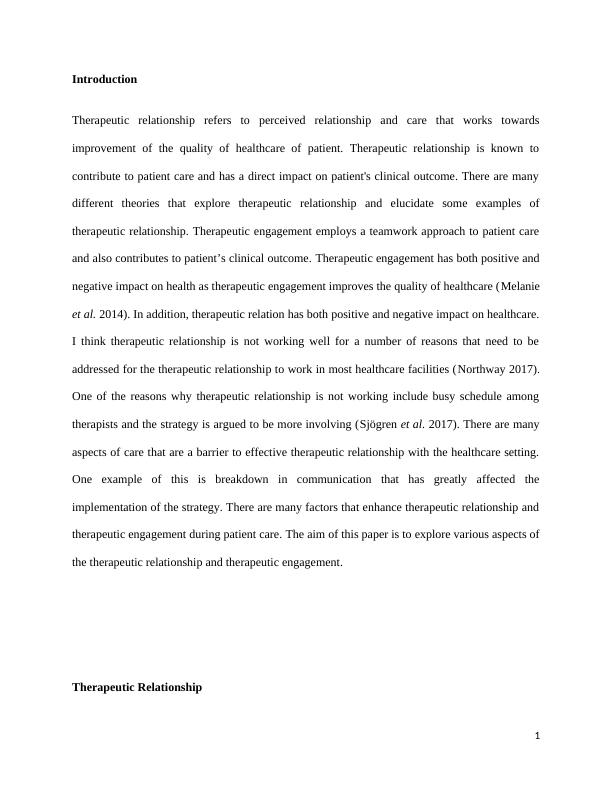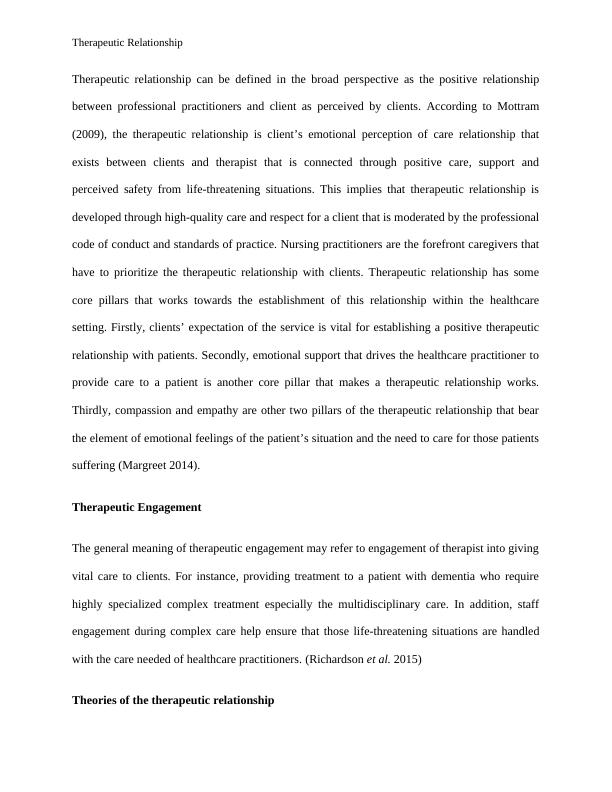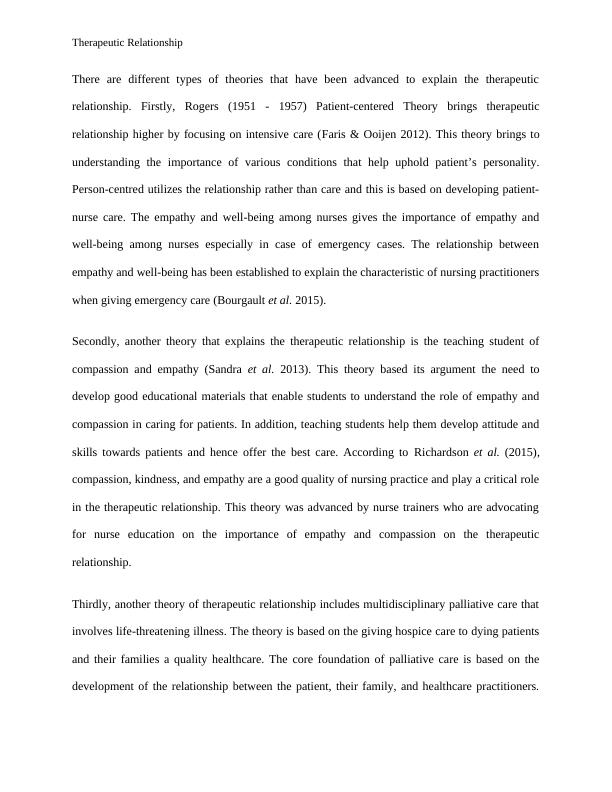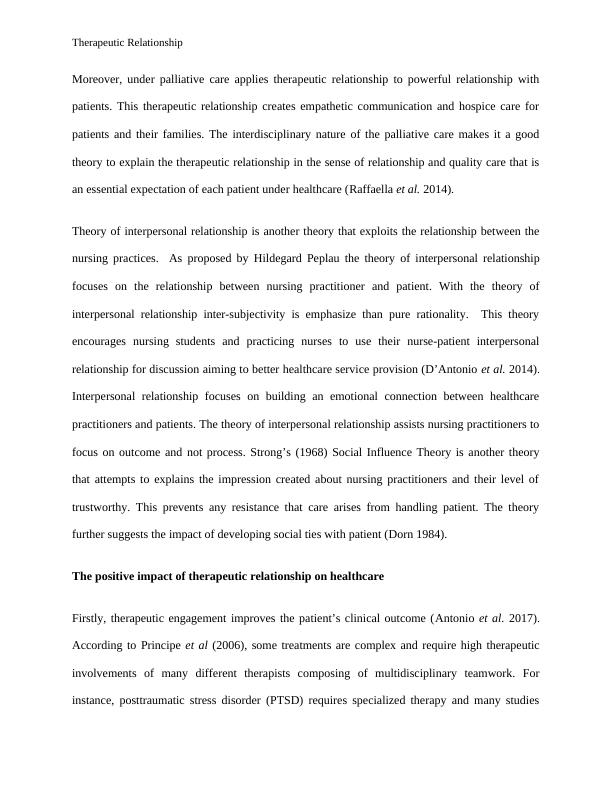Exploring Therapeutic Relationship and Therapeutic Engagement in Healthcare
Added on 2023-06-13
15 Pages4139 Words379 Views
Introduction
Therapeutic relationship refers to perceived relationship and care that works towards
improvement of the quality of healthcare of patient. Therapeutic relationship is known to
contribute to patient care and has a direct impact on patient's clinical outcome. There are many
different theories that explore therapeutic relationship and elucidate some examples of
therapeutic relationship. Therapeutic engagement employs a teamwork approach to patient care
and also contributes to patient’s clinical outcome. Therapeutic engagement has both positive and
negative impact on health as therapeutic engagement improves the quality of healthcare (Melanie
et al. 2014). In addition, therapeutic relation has both positive and negative impact on healthcare.
I think therapeutic relationship is not working well for a number of reasons that need to be
addressed for the therapeutic relationship to work in most healthcare facilities (Northway 2017).
One of the reasons why therapeutic relationship is not working include busy schedule among
therapists and the strategy is argued to be more involving (Sjögren et al. 2017). There are many
aspects of care that are a barrier to effective therapeutic relationship with the healthcare setting.
One example of this is breakdown in communication that has greatly affected the
implementation of the strategy. There are many factors that enhance therapeutic relationship and
therapeutic engagement during patient care. The aim of this paper is to explore various aspects of
the therapeutic relationship and therapeutic engagement.
Therapeutic Relationship
1
Therapeutic relationship refers to perceived relationship and care that works towards
improvement of the quality of healthcare of patient. Therapeutic relationship is known to
contribute to patient care and has a direct impact on patient's clinical outcome. There are many
different theories that explore therapeutic relationship and elucidate some examples of
therapeutic relationship. Therapeutic engagement employs a teamwork approach to patient care
and also contributes to patient’s clinical outcome. Therapeutic engagement has both positive and
negative impact on health as therapeutic engagement improves the quality of healthcare (Melanie
et al. 2014). In addition, therapeutic relation has both positive and negative impact on healthcare.
I think therapeutic relationship is not working well for a number of reasons that need to be
addressed for the therapeutic relationship to work in most healthcare facilities (Northway 2017).
One of the reasons why therapeutic relationship is not working include busy schedule among
therapists and the strategy is argued to be more involving (Sjögren et al. 2017). There are many
aspects of care that are a barrier to effective therapeutic relationship with the healthcare setting.
One example of this is breakdown in communication that has greatly affected the
implementation of the strategy. There are many factors that enhance therapeutic relationship and
therapeutic engagement during patient care. The aim of this paper is to explore various aspects of
the therapeutic relationship and therapeutic engagement.
Therapeutic Relationship
1

Therapeutic Relationship
Therapeutic relationship can be defined in the broad perspective as the positive relationship
between professional practitioners and client as perceived by clients. According to Mottram
(2009), the therapeutic relationship is client’s emotional perception of care relationship that
exists between clients and therapist that is connected through positive care, support and
perceived safety from life-threatening situations. This implies that therapeutic relationship is
developed through high-quality care and respect for a client that is moderated by the professional
code of conduct and standards of practice. Nursing practitioners are the forefront caregivers that
have to prioritize the therapeutic relationship with clients. Therapeutic relationship has some
core pillars that works towards the establishment of this relationship within the healthcare
setting. Firstly, clients’ expectation of the service is vital for establishing a positive therapeutic
relationship with patients. Secondly, emotional support that drives the healthcare practitioner to
provide care to a patient is another core pillar that makes a therapeutic relationship works.
Thirdly, compassion and empathy are other two pillars of the therapeutic relationship that bear
the element of emotional feelings of the patient’s situation and the need to care for those patients
suffering (Margreet 2014).
Therapeutic Engagement
The general meaning of therapeutic engagement may refer to engagement of therapist into giving
vital care to clients. For instance, providing treatment to a patient with dementia who require
highly specialized complex treatment especially the multidisciplinary care. In addition, staff
engagement during complex care help ensure that those life-threatening situations are handled
with the care needed of healthcare practitioners. (Richardson et al. 2015)
Theories of the therapeutic relationship
Therapeutic relationship can be defined in the broad perspective as the positive relationship
between professional practitioners and client as perceived by clients. According to Mottram
(2009), the therapeutic relationship is client’s emotional perception of care relationship that
exists between clients and therapist that is connected through positive care, support and
perceived safety from life-threatening situations. This implies that therapeutic relationship is
developed through high-quality care and respect for a client that is moderated by the professional
code of conduct and standards of practice. Nursing practitioners are the forefront caregivers that
have to prioritize the therapeutic relationship with clients. Therapeutic relationship has some
core pillars that works towards the establishment of this relationship within the healthcare
setting. Firstly, clients’ expectation of the service is vital for establishing a positive therapeutic
relationship with patients. Secondly, emotional support that drives the healthcare practitioner to
provide care to a patient is another core pillar that makes a therapeutic relationship works.
Thirdly, compassion and empathy are other two pillars of the therapeutic relationship that bear
the element of emotional feelings of the patient’s situation and the need to care for those patients
suffering (Margreet 2014).
Therapeutic Engagement
The general meaning of therapeutic engagement may refer to engagement of therapist into giving
vital care to clients. For instance, providing treatment to a patient with dementia who require
highly specialized complex treatment especially the multidisciplinary care. In addition, staff
engagement during complex care help ensure that those life-threatening situations are handled
with the care needed of healthcare practitioners. (Richardson et al. 2015)
Theories of the therapeutic relationship

Therapeutic Relationship
There are different types of theories that have been advanced to explain the therapeutic
relationship. Firstly, Rogers (1951 - 1957) Patient-centered Theory brings therapeutic
relationship higher by focusing on intensive care (Faris & Ooijen 2012). This theory brings to
understanding the importance of various conditions that help uphold patient’s personality.
Person-centred utilizes the relationship rather than care and this is based on developing patient-
nurse care. The empathy and well-being among nurses gives the importance of empathy and
well-being among nurses especially in case of emergency cases. The relationship between
empathy and well-being has been established to explain the characteristic of nursing practitioners
when giving emergency care (Bourgault et al. 2015).
Secondly, another theory that explains the therapeutic relationship is the teaching student of
compassion and empathy (Sandra et al. 2013). This theory based its argument the need to
develop good educational materials that enable students to understand the role of empathy and
compassion in caring for patients. In addition, teaching students help them develop attitude and
skills towards patients and hence offer the best care. According to Richardson et al. (2015),
compassion, kindness, and empathy are a good quality of nursing practice and play a critical role
in the therapeutic relationship. This theory was advanced by nurse trainers who are advocating
for nurse education on the importance of empathy and compassion on the therapeutic
relationship.
Thirdly, another theory of therapeutic relationship includes multidisciplinary palliative care that
involves life-threatening illness. The theory is based on the giving hospice care to dying patients
and their families a quality healthcare. The core foundation of palliative care is based on the
development of the relationship between the patient, their family, and healthcare practitioners.
There are different types of theories that have been advanced to explain the therapeutic
relationship. Firstly, Rogers (1951 - 1957) Patient-centered Theory brings therapeutic
relationship higher by focusing on intensive care (Faris & Ooijen 2012). This theory brings to
understanding the importance of various conditions that help uphold patient’s personality.
Person-centred utilizes the relationship rather than care and this is based on developing patient-
nurse care. The empathy and well-being among nurses gives the importance of empathy and
well-being among nurses especially in case of emergency cases. The relationship between
empathy and well-being has been established to explain the characteristic of nursing practitioners
when giving emergency care (Bourgault et al. 2015).
Secondly, another theory that explains the therapeutic relationship is the teaching student of
compassion and empathy (Sandra et al. 2013). This theory based its argument the need to
develop good educational materials that enable students to understand the role of empathy and
compassion in caring for patients. In addition, teaching students help them develop attitude and
skills towards patients and hence offer the best care. According to Richardson et al. (2015),
compassion, kindness, and empathy are a good quality of nursing practice and play a critical role
in the therapeutic relationship. This theory was advanced by nurse trainers who are advocating
for nurse education on the importance of empathy and compassion on the therapeutic
relationship.
Thirdly, another theory of therapeutic relationship includes multidisciplinary palliative care that
involves life-threatening illness. The theory is based on the giving hospice care to dying patients
and their families a quality healthcare. The core foundation of palliative care is based on the
development of the relationship between the patient, their family, and healthcare practitioners.

Therapeutic Relationship
Moreover, under palliative care applies therapeutic relationship to powerful relationship with
patients. This therapeutic relationship creates empathetic communication and hospice care for
patients and their families. The interdisciplinary nature of the palliative care makes it a good
theory to explain the therapeutic relationship in the sense of relationship and quality care that is
an essential expectation of each patient under healthcare (Raffaella et al. 2014).
Theory of interpersonal relationship is another theory that exploits the relationship between the
nursing practices. As proposed by Hildegard Peplau the theory of interpersonal relationship
focuses on the relationship between nursing practitioner and patient. With the theory of
interpersonal relationship inter-subjectivity is emphasize than pure rationality. This theory
encourages nursing students and practicing nurses to use their nurse-patient interpersonal
relationship for discussion aiming to better healthcare service provision (D’Antonio et al. 2014).
Interpersonal relationship focuses on building an emotional connection between healthcare
practitioners and patients. The theory of interpersonal relationship assists nursing practitioners to
focus on outcome and not process. Strong’s (1968) Social Influence Theory is another theory
that attempts to explains the impression created about nursing practitioners and their level of
trustworthy. This prevents any resistance that care arises from handling patient. The theory
further suggests the impact of developing social ties with patient (Dorn 1984).
The positive impact of therapeutic relationship on healthcare
Firstly, therapeutic engagement improves the patient’s clinical outcome (Antonio et al. 2017).
According to Principe et al (2006), some treatments are complex and require high therapeutic
involvements of many different therapists composing of multidisciplinary teamwork. For
instance, posttraumatic stress disorder (PTSD) requires specialized therapy and many studies
Moreover, under palliative care applies therapeutic relationship to powerful relationship with
patients. This therapeutic relationship creates empathetic communication and hospice care for
patients and their families. The interdisciplinary nature of the palliative care makes it a good
theory to explain the therapeutic relationship in the sense of relationship and quality care that is
an essential expectation of each patient under healthcare (Raffaella et al. 2014).
Theory of interpersonal relationship is another theory that exploits the relationship between the
nursing practices. As proposed by Hildegard Peplau the theory of interpersonal relationship
focuses on the relationship between nursing practitioner and patient. With the theory of
interpersonal relationship inter-subjectivity is emphasize than pure rationality. This theory
encourages nursing students and practicing nurses to use their nurse-patient interpersonal
relationship for discussion aiming to better healthcare service provision (D’Antonio et al. 2014).
Interpersonal relationship focuses on building an emotional connection between healthcare
practitioners and patients. The theory of interpersonal relationship assists nursing practitioners to
focus on outcome and not process. Strong’s (1968) Social Influence Theory is another theory
that attempts to explains the impression created about nursing practitioners and their level of
trustworthy. This prevents any resistance that care arises from handling patient. The theory
further suggests the impact of developing social ties with patient (Dorn 1984).
The positive impact of therapeutic relationship on healthcare
Firstly, therapeutic engagement improves the patient’s clinical outcome (Antonio et al. 2017).
According to Principe et al (2006), some treatments are complex and require high therapeutic
involvements of many different therapists composing of multidisciplinary teamwork. For
instance, posttraumatic stress disorder (PTSD) requires specialized therapy and many studies

End of preview
Want to access all the pages? Upload your documents or become a member.
Related Documents
The Therapeutic Relationship Essaylg...
|13
|3547
|508
Rapport: A key to treatment successlg...
|4
|3045
|333
Therapeutic Relationshiplg...
|8
|2344
|166
Therapeutic Communication Skills and Inter-Professional Collaboration in Nursinglg...
|8
|1847
|470
Importance of Therapeutic Relationship in Treating Depressionlg...
|7
|1536
|97
Importance of Therapeutic Relationship in Counsellinglg...
|8
|2556
|325
